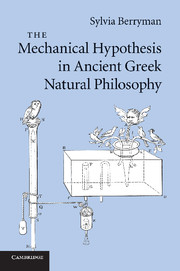Book contents
- Frontmatter
- Contents
- List of illustrations
- Acknowledgements
- Introduction
- 1 Mechanics and the mechanical: some problems of terminology
- 2 ‘Mechanistic’ thought before mechanics?
- 3 Mechanics in the fourth century
- 4 The theory and practice of ancient Greek mechanics
- 5 Ancient Greek mechanics continued: the case of pneumatics
- 6 The philosophical reception of mechanics in antiquity
- Conclusion
- Appendix: Ancient mechanics and the mechanical in the seventeenth century
- Bibliography
- Index of passages
- General index
6 - The philosophical reception of mechanics in antiquity
Published online by Cambridge University Press: 24 December 2009
- Frontmatter
- Contents
- List of illustrations
- Acknowledgements
- Introduction
- 1 Mechanics and the mechanical: some problems of terminology
- 2 ‘Mechanistic’ thought before mechanics?
- 3 Mechanics in the fourth century
- 4 The theory and practice of ancient Greek mechanics
- 5 Ancient Greek mechanics continued: the case of pneumatics
- 6 The philosophical reception of mechanics in antiquity
- Conclusion
- Appendix: Ancient mechanics and the mechanical in the seventeenth century
- Bibliography
- Index of passages
- General index
Summary
In outlining the history of the discipline, I have already indicated a number of ways in which specific theories and concepts provoked philosophical responses from the mechanical theorists themselves. I shall now consider evidence from ancient Greek natural philosophers – including philosophically inclined medical theorists – concerning the reception of ideas from mechanics.
On a number of specific issues, natural philosophers engaged with the implications of mechanical theory and took seriously the question of its relationship to natural philosophy. There is, moreover, some evidence of a commitment, in a few ancient thinkers, to the use of mechanics as a heuristic. There are reports in late antiquity of those who considered whether the natural world might be understood to ‘work like that’: to function in ways that could be illuminated by appeal to the working artifacts that were available at the time. This latter evidence tends to cluster in three areas: the functioning of organisms, the motion of the heavenly bodies, and – at a more general level – the operation of causality in nature as a whole in relation to a directing intelligence.
The existence of complex working artifacts exhibiting regular, pre-programmed causal sequences in their operation showed vividly what could be achieved by material arrangement alone. This, in turn, threatened some of the classic arguments for teleological explanations, which are typically based on the impossibility of adequate explanation of the phenomena using the resources of materialism alone.
- Type
- Chapter
- Information
- The Mechanical Hypothesis in Ancient Greek Natural Philosophy , pp. 177 - 230Publisher: Cambridge University PressPrint publication year: 2009



